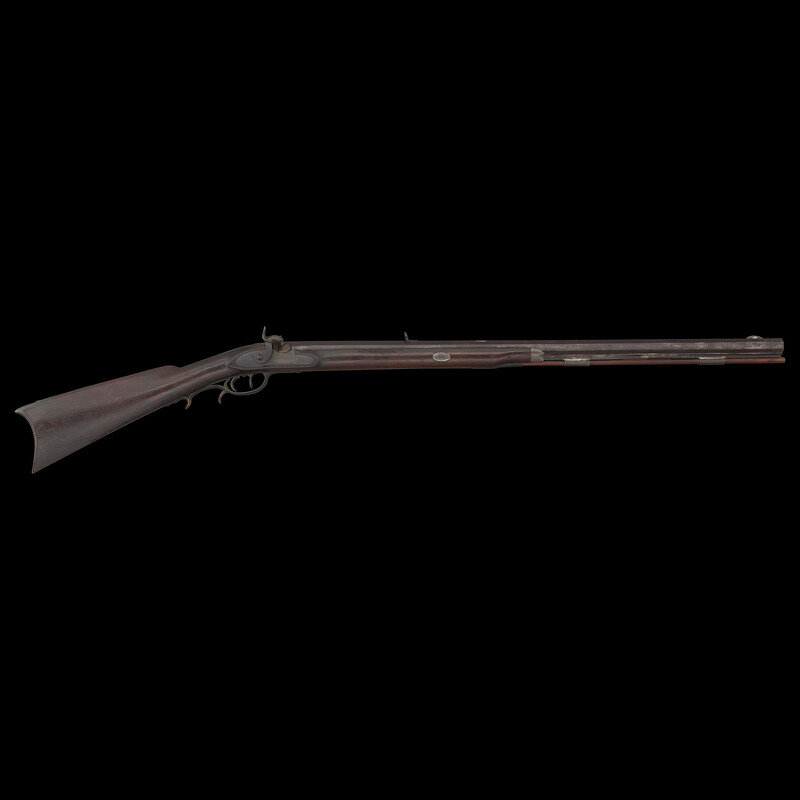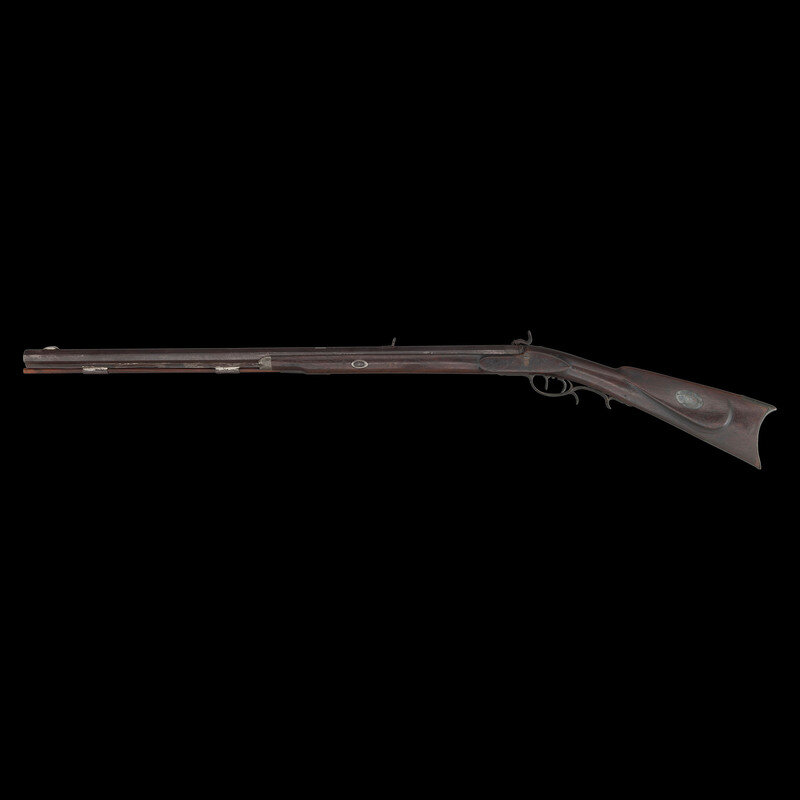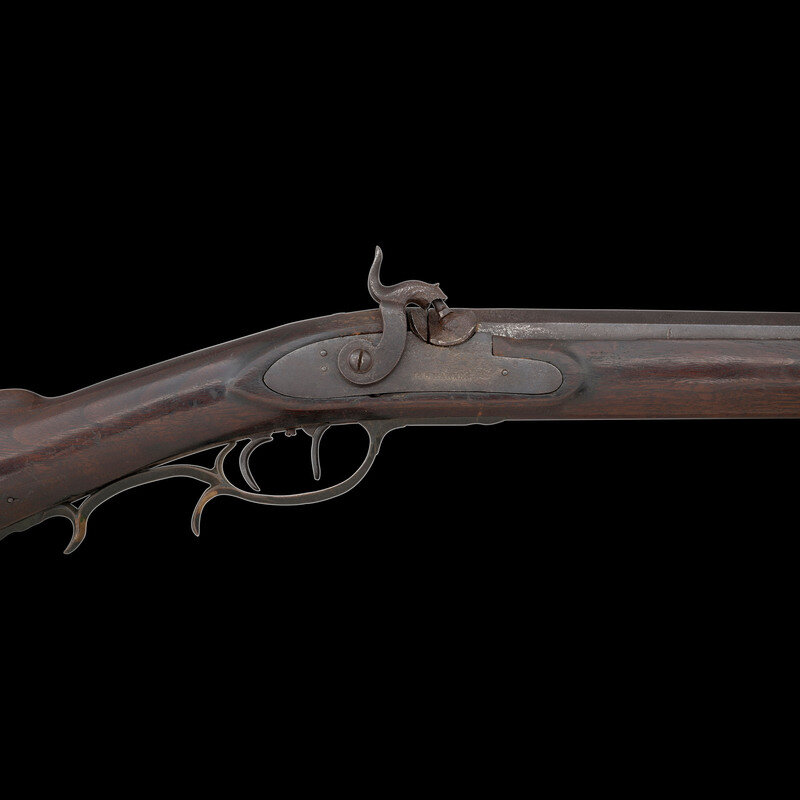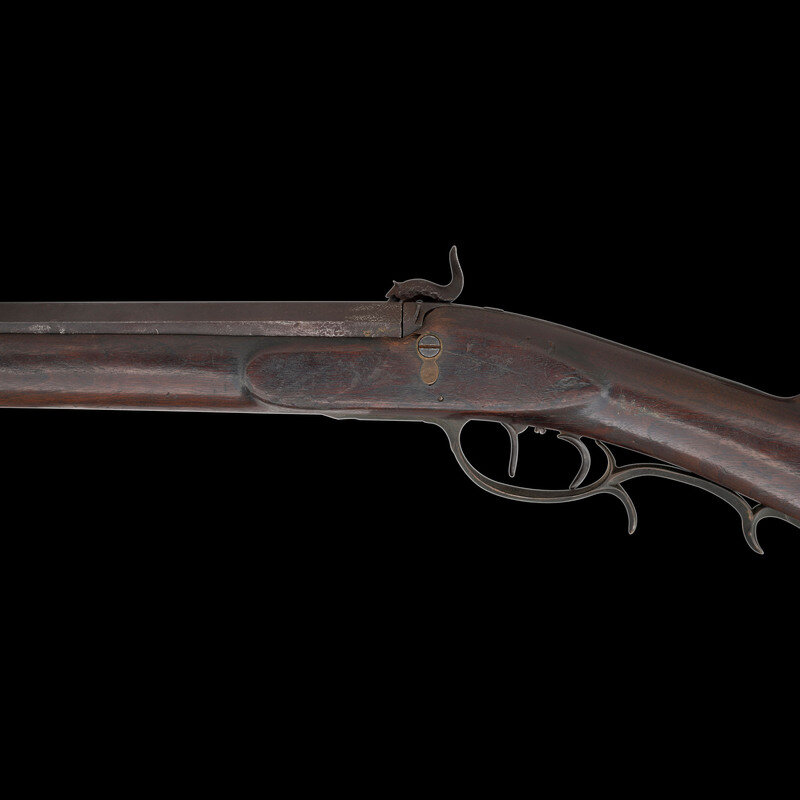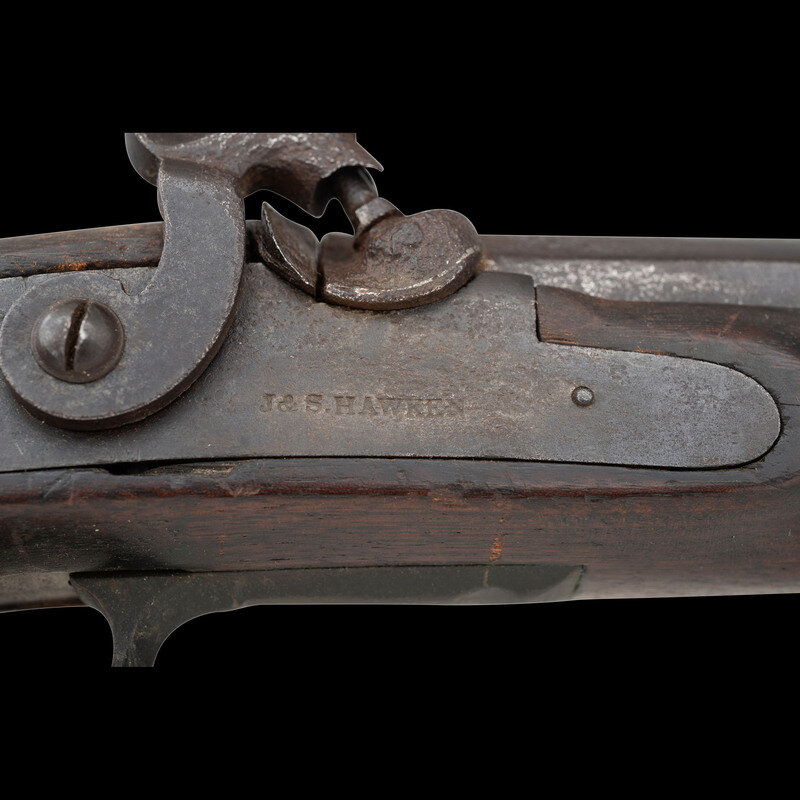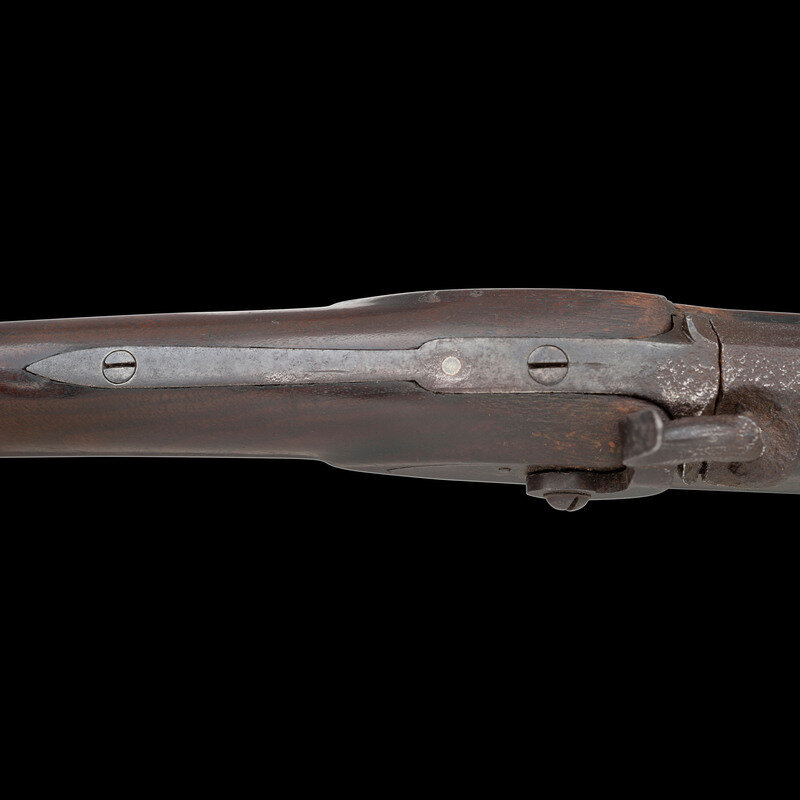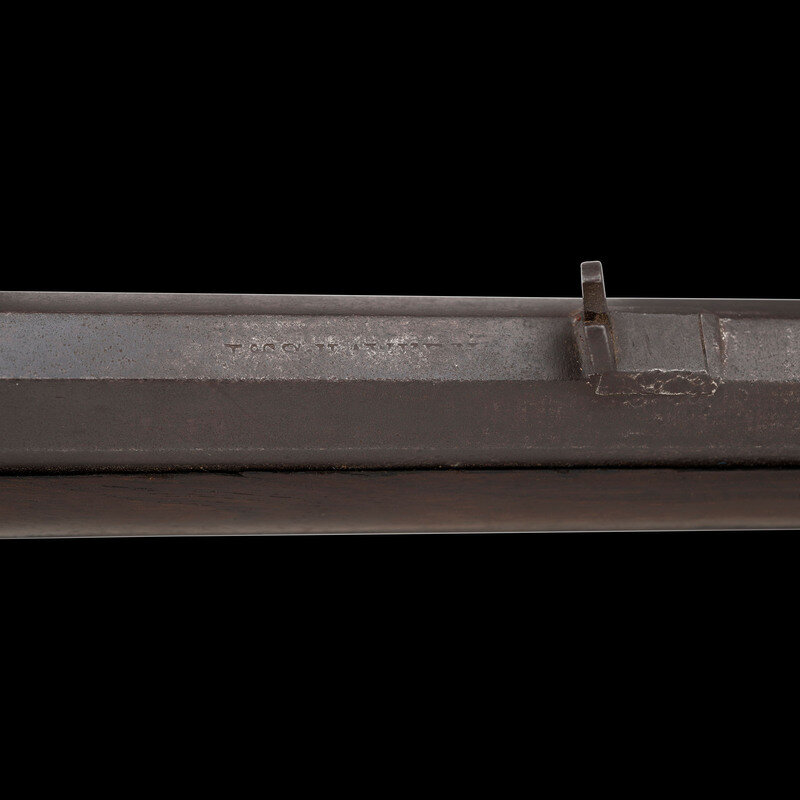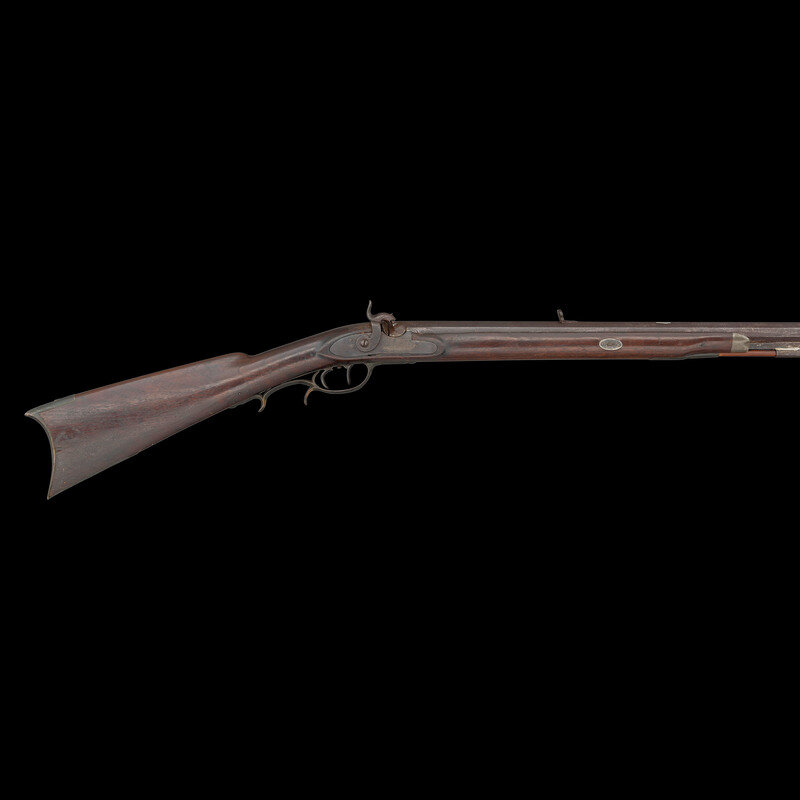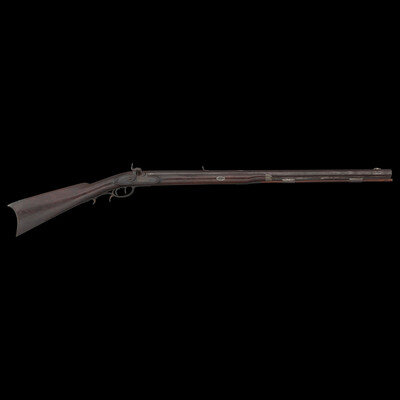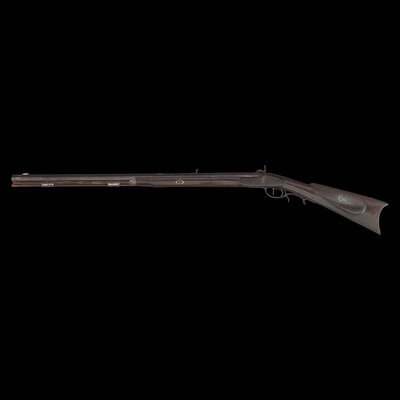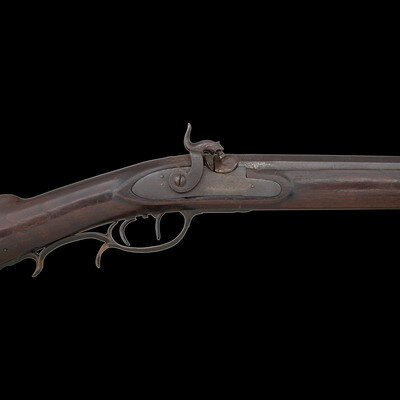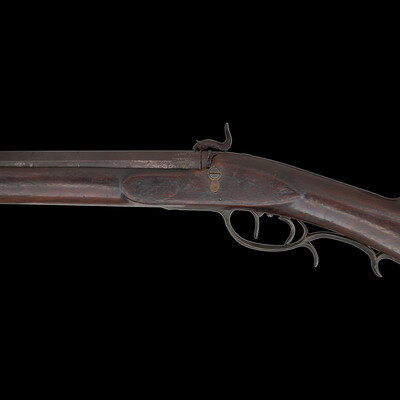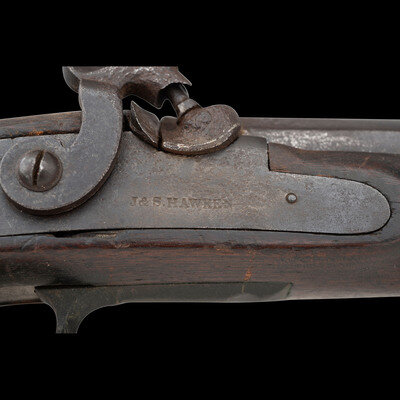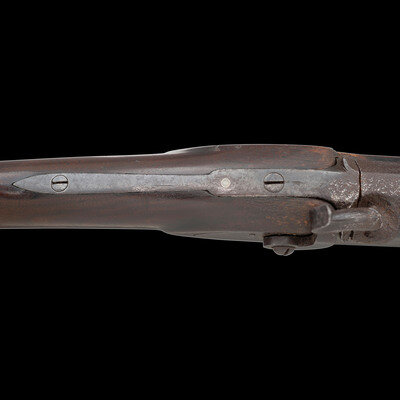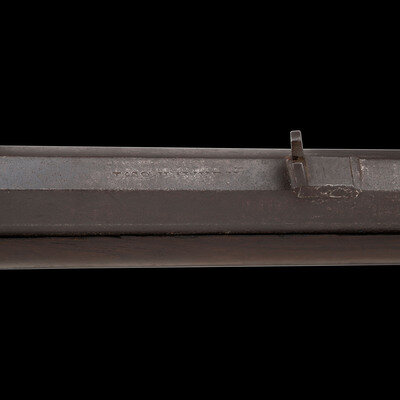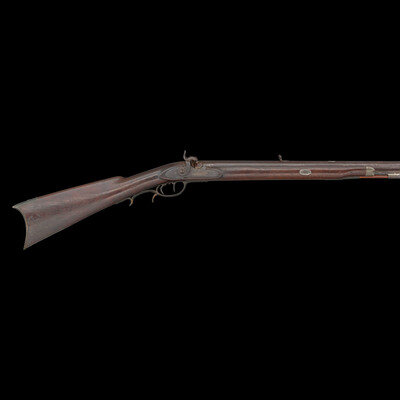J&S Hawken Percussion Sporting Rifle
Sale 2030 - Arms, Armor and Militaria
Oct 23, 2024
10:00AM ET
Live / Cincinnati
Estimate
$8,000 -
$12,000
Lot Description
J&S Hawken Percussion Sporting Rifle
Western Expansion
.43 caliber. 31" single-keyed octagonal barrel. NSN. Browned finish, brass furniture, pewter nose cap, German silver wedge escutcheons, walnut half-stock with raised cheek rest. Single shot percussion muzzleloading rifle. Both lock and barrel are marked J&S HAWKEN, although the barrel marking is weak. Lock marked J&S Hawken guns are extremely rare. Single screw percussion lock is unadorned and equipped with double-set triggers. Rifle of typical Hawken sporting form circa 1840s, with long, double screw iron tang, single keyed half-stock with pewter nose cap, double finger rest brass triggerguard, brass butt plate and plain brass toe plate. Barrel mounted with a dovetailed buckhorn fixed rear sight that has been moved at least once and a secondary dovetail notch is present on the barrel, now filled with pewter. A dovetailed German silver front sight blade is in place on the barrel. Medium weight barrel measures .95" across the flats. Two added ramrod thimbles are present on the lower lug of the barrel, with the gun appearing to originally have had only one pipe. Includes a wooden ramrod that is a more modern replacement. This rifle was previously part of the noted collection of St. Louis rifles of DeWitt R Pourie, as his item #P-536 and includes his 10-30-72 dated collection note card on the rifle. Pourie was the co-author of Gateway Gunsmiths - A Survey of St. Louis, MO Gunmakers, Gunsmiths, Gun Dealers and Patentees 1764-1940 with Victor Paul.
No name is more synonymous with the rifles of the great plains and pre-Civil War western expansion than that of Hawken. Jacob Hawken moved to St. Louis from Hagerstown Maryland in 1818 and was followed by his younger brother Samuel in 1822. Jacob had learned the trade of gun making from his father Christian and also spent time working at the US Arsenal at Harpers Ferry. Initially the Hawken brothers appear to have focused more on traditional gunsmithing and repairs in St. Louis than firearms manufacturing. The earliest guns they produced would have certainly been flintlocks with percussion guns not becoming typical until the early 1830s. Early St. Louis Hawken-marked percussion rifles were brass mounted full-stock guns that followed the general form of the Pennsylvania style rifles they would have produced in Hagerstown.
Subsequently, the brothers introduced the prototypical "Plains Rifle", also referred to at times as the "Rocky Mountain" rifle. These were typically very sturdy iron mounted large bore percussion rifles with double-set triggers that ranged from .52 to .60 caliber. They utilized heavy octagonal barrels that were typically 30" to 40" in length, normally measured at least 1.125" across the barrel flats, were usually rifled with seven grooves and were typically retained by two iron keys. The guns regularly utilized commercial locks marked by their makers or retailers. Fixed sights of the buckhorn rear and Rocky Mountain blade front were typical as well. These rifles were so perfectly adapted to the life of the mid-19th century plains hunter and mountain man that their popularity inspired a number of local gunmakers to offer guns of the same general pattern. Variations of the Hawken theme were produced by such famous St. Louis makers as Albright, Beauvais, Dimick and Gemmer.
No name is more synonymous with the rifles of the great plains and pre-Civil War western expansion than that of Hawken. Jacob Hawken moved to St. Louis from Hagerstown Maryland in 1818 and was followed by his younger brother Samuel in 1822. Jacob had learned the trade of gun making from his father Christian and also spent time working at the US Arsenal at Harpers Ferry. Initially the Hawken brothers appear to have focused more on traditional gunsmithing and repairs in St. Louis than firearms manufacturing. The earliest guns they produced would have certainly been flintlocks with percussion guns not becoming typical until the early 1830s. Early St. Louis Hawken-marked percussion rifles were brass mounted full-stock guns that followed the general form of the Pennsylvania style rifles they would have produced in Hagerstown.
Subsequently, the brothers introduced the prototypical "Plains Rifle", also referred to at times as the "Rocky Mountain" rifle. These were typically very sturdy iron mounted large bore percussion rifles with double-set triggers that ranged from .52 to .60 caliber. They utilized heavy octagonal barrels that were typically 30" to 40" in length, normally measured at least 1.125" across the barrel flats, were usually rifled with seven grooves and were typically retained by two iron keys. The guns regularly utilized commercial locks marked by their makers or retailers. Fixed sights of the buckhorn rear and Rocky Mountain blade front were typical as well. These rifles were so perfectly adapted to the life of the mid-19th century plains hunter and mountain man that their popularity inspired a number of local gunmakers to offer guns of the same general pattern. Variations of the Hawken theme were produced by such famous St. Louis makers as Albright, Beauvais, Dimick and Gemmer.
This lot is located in Cincinnati.
ex-DeWitt R. Pourie Collection
Condition Report
Good. Bore fair to good, with visible rifling and heavy oxidation with moderate pitting. Barrel with some traces of old brown mixed with surface oxidation and discoloration, showing some moderate pitting in the breech and bolster area, and some lightly scattered pitting here and there. Tang with a filled hole, possibly where a screw post tang sight was located at some point in time. Lock with moderate oxidation on its exterior surface remains partially functional but will not hold at the full cock position when installed in the gun. The lock does hold when removed, suggesting an issue with shrinkage of the wood in the mortise or with the double set trigger system. Brass furniture with a deep, dark greenish black patina that is uncleaned. German silver deeply tarnished. Wood with some moderate wear and traces of finish, showing a small, tight crack in the counterpane. Otherwise the stock shows scattered bumps, dings and mars from handling and use.
The physical condition of lots in our auctions can vary due to
age, normal wear and tear, previous damage, and
restoration/repair. All lots are sold "AS IS," in the condition
they are in at the time of the auction, and we and the seller make
no representation or warranty and assume no liability of any kind
as to a lot's condition. Any reference to condition in a catalogue
description or a condition report shall not amount to a full
accounting of condition. Condition reports prepared by Hindman
staff are provided as a convenience and may be requested from the
Department prior to bidding.
The absence of a posted condition report on the Hindman website or
in our catalogues should not be interpreted as commentary on an
item's condition. Prospective buyers are responsible for
inspecting a lot or sending their agent or conservator to inspect
the lot on their behalf, and for ensuring that they have
requested, received and understood any condition report provided
by Hindman.
Please email [email protected] for any additional information or questions you may have regarding this lot.
